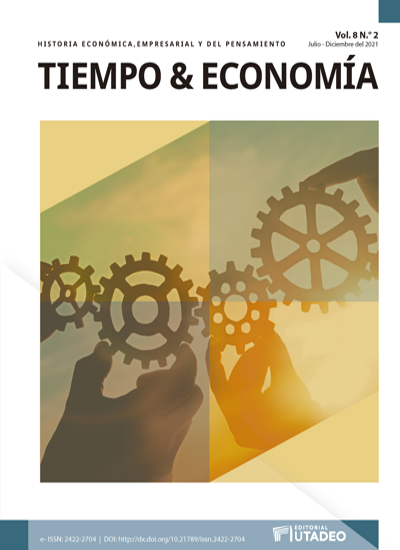
Esta obra está bajo una licencia internacional Creative Commons Atribución-NoComercial-CompartirIgual 4.0.
Esta obra está bajo una licencia internacional Creative Commons Atribución-NoComercial-CompartirIgual 4.0.
Resumen
La situación mundial actual, caracterizada por problemáticas de tipo social, medio ambiental y económico, plantea la necesidad de nuevas formas de organización. Existen algunos temas que podrían ayudar al respecto, como la responsabilidad social empresarial. Sin embargo, existe confusión en cuanto a los beneficios que esta aporta. Por ello, se realiza una revisión literaria para proporcionar al lector una introducción sobre este tema. Los hallazgos señalan que la responsabilidad social empresarial tiene una relación positiva con temas relevantes como la reputación corporativa, la intención de compra, el voluntarismo, el compromiso, la sostenibilidad y el desempeño organizacional, entre otros. Por ende, es necesario continuar con el desarrollo teórico y práctico de la responsabilidad social por parte de la academia y el sector empresarial, respectivamente.
Citas
Asrar-ul-Haq, M., Kuchinke, K., & Iqbal, A. (2017). The relationship between corporate social responsibility, job satisfaction, and organizational commitment: Case of Pakistani higher education. Journal of Cleaner Production, 142, 2352-2363. http://dx.doi.org/10.1016/j.jclepro.2016.11.040
Bekele, A., Bosona, T., Nordmark, I., Gebresenbet, G., & Ljungberg, D. (2012). Assessing the sustainability of food retail business: The case of Konsum Värmland, Sweden. Journal of Service Science and Management, 5, 373-385. http://dx.doi.org/10.4236/jssm.2012.54044
Bostrom, M., Jonsson, A. M., Lockie, S., Mol, A. P. J., & Oosterveer, P. (2014). Sustainable and responsible supply chain governance: Challenges and opportunities. Journal of Cleaner Production, 107, 1-7. http://dx.doi.org/10.1016/j.jclepro.2014.11.050
Byun, S., & Oh, S. (2017). Local corporate social responsibility, media coverage, and shareholder value. Journal of Banking and Finance, 87, 68-86. http://dx.doi.org/10.1016/j.jbankfin.2017.09.01
Centro Mexicano para la Filantropía [CEMEFI A.C.] (2015). El concepto de responsabilidad social empresarial. http://www.cemefi.org/esr/images/stories/pdf/esr/concepto_esr.pdf
Charlo-Molina, M. J., & Moya-Clemente, I. (2010). El comportamiento financiero de las empresas socialmente responsables. Investigaciones Europeas de Dirección y Economía de la Empresa, 16(2), 15-25. http://www.redalyc.org/articulo.oa?id=274120099001
Chiang, W., Shang, J., & Sun, L. (2017). Broad bond rating change and irresponsible corporate social responsibility activities. Advances in Accounting, 39, 32-46. http://dx.doi.org/10.1016/j.adiac.2017.09.002
Creswell, J. W. (2009). Research design: Qualitative, quantitative, and mixed methods approaches. SAGE.
Cronqvist, H., & Yu, F. (2017). Shaped by their daughters: Executives, female socialization, and corporate social responsibility. Journal of Financial Economics, 126(3), 543-562. https://doi.org/10.1016/j.jfineco.2017.09.00
Cycyota, C., Ferrante, C., & Schoeder, J. M. (2016). Corporate social responsibility and employee volunteerism: What do the best companies do? Business Horizons, 59, 321-329. http://dx.doi.org/10.1016/j.bushor.2016.01.004
Dadhich, P., Genovese, A., Kumar, N., & Acquaye, A. (2015). Developing sustainable supply chains in the UK construction industry: A case study. Management of Environmental Quality: An International Journal, 25(4), 431-445. http://dx.doi.org/10.1016/j.ijpe.2014.12.012
Darus, F., Ahmad-Shukri, A., Yusoff, H., Ramlia, A., Zain, M., & Abu-Bakar, N. (2017). Empowering social responsibility of Islamic organizations through Waqf. Research in International Business and Finance, 42, 959-965. http://dx.doi.org/10.1016/j.ribaf.2017.07.030
Evans, R., Pane-Haden, S., Clayton, R., & Novicevic, M. (2013). History-of-management-thought about social responsibility. Journal of Management History, 19(1), 8-32. http://dx.doi.org/10.1108/17511341311286150
Freeman, I., & Hasnaoui, A. (2011). The meaning of corporate social responsibility: The vision of four nations. Journal of Business Ethics, 100, 419-443. http://dx.doi.org/10.1007/s10551-010-0688-6
García-Madariaga, J., & Rodríguez-Rivera, F. (2017). Corporate social responsibility, customer satisfaction, corporate reputation, and firms’ market value: Evidence from the automobile industry. Spanish Journal of Marketing 21(S1), 39-53. http://dx.doi.org/10.1016/j.sjme.2017.05.003
Gras-Gil, E., Palacios-Manzano, M., & Hernández-Fernández, J. (2016). Investigating the relationship between corporate social responsibility and earnings management: Evidence from Spain. BRQ Business Research Quarterly, 19, 289-299. http://dx.doi.org/10.1016/j.brq.2016.02.002
Haleem, F., Farooq, S., & Vejrum-Wæhrens, B. (2017). Supplier corporate social responsibility practices and sourcing geography. Journal of Cleaner Production, 153, 92-103. http://dx.doi.org/10.1016/j.jclepro.2017.03.143
Hasan, M., & Habib, A. (2017). Corporate life cycle, organizational financial resources and corporate social responsibility. Journal of Contemporary Accounting & Economics, 13, 20-36. http://dx.doi.org/10.1016/j.jcae.2017.01.002
Herbohn, K., Walker, J., & Yien-Loo, H. M. (2014). Corporate social responsibility: The link between sustainability disclosure and sustainability performance. ABACUS, 50(4), 422-459. http://dx.doi.org/10.1111/abac.12036
Herrera-Madueño, J., Larrán-Jorge, M., Martínez-Conesa, I., & Martínez-Martínez, D. (2015). Relationship between corporate social responsibility and competitive performance in Spanish SMEs: Empirical evidence from a stakeholders’ perspective. BRQ Business Research Quarterly, 19(1), 55-72. http://dx.doi.org/10.1016/j.brq.2015.06.002
Jong, M., & Meer, M. (2017). How does it fit? Exploring the congruence between organizations and their corporate social responsibility (CSR) activities. Journal of Business Ethics, 143, 71-83. http://dx.doi.org/10.1007/s10551-015-2782-2
Kim, J., Jun-Song, H., & Lee, C. (2016). Effects of corporate social responsibility and internal marketing on organizational commitment and turnover intentions. International Journal of Hospitality Management, 55, 25-32. http://dx.doi.org/10.1016/j.ijhm.2016.02.007
Kurki, S., & Wilenius, M. (2014). Organisations and the sixth wave: Are ethics transforming our economies in the coming decades? Futures, 71, 146-158. http://dx.doi.org/10.1016/j.futures.2014.09.001
Laguir, I., Stagliano, R., & Elbaz, J. (2015). Does corporate social responsibility affect corporate tax aggressiveness? Journal of Cleaner Production, 107, 662-675. http://dx.doi.org/10.1016/j.jclepro.2015.05.059
Lindgreen, A., Swaen, V., & Johnston, W. (2009). Corporate social responsibility: An empirical investigation of U.S. organizations. Journal of Business Ethics, 85, 303-323. http://dx.doi.org/10.1007/s10551-008-9738-8
Matherne, C., Waterwall, B., Ringb, J. K., & Credo, K. (2017). Beyond organizational identification: The legitimization and robustness of family identification in the family firm. Journal of Family Business Strategy, 8, 170-184. http://dx.doi.org/10.1016/j.jfbs.2017.08.001
McCarthy, S., Oliver, B., & Song, S. (2017). Corporate social responsibility and CEO confidence. Journal of Banking and Finance, 75, 280-291. http://dx.doi.org/10.1016/j.jbankfin.2016.11.02
Mehralian, G., Nazari, J., Zarei, L., & Rasekh, H. (2016). The effects of corporate social responsibility on organizational performance in the Iranian pharmaceutical industry: The mediating role of TQM. Journal of Cleaner Production, 135, 689-698. http://dx.doi.org/10.1016/j.jclepro.2016.06.116
Michelini, L., & Fiorentino, D. (2012). New business models for creating shared value. Social Responsibility Journal, 8(4), 561-577. http://dx.doi.org/10.1108/17471111211272129
Mostovicz, E. I., Kakabadse, N. K., & Kakabadse, A. (2011). Corporate governance: quo vadis? Corporate Governance: The International Journal of Business in Society, 11(5), 613-626. http://dx.doi.org/10.1108/14720701111177019
Murmura, F., Bravi, L., & Palazzi, F. (2017). Evaluating companies’ commitment to corporate social responsibility: Perceptions of the SA 8000 standard. Journal of Cleaner Production, 164, 1406-1418. http://dx.doi.org/10.1016/j.jclepro.2017.07.073
Ott, C. (2009). Corporate governance and corporate social responsibility in profit- and in non-profit-organization. Journal fur Rechtspolitik, 17, 255-262. http://dx.doi.org/10.1007/s00730-009-0286-z
Reverte, C., Gomez-Melero, E., & Cegarra-Navarro, J. (2016). The influence of corporate social responsibility practices on organizational performance: Evidence from eco-responsible Spanish firm. Journal of Cleaner Production, 112, 2870-2884. http://dx.doi.org/10.1016/j.jclepro.2015.09.128
Rodriguez-Fernandez, M. (2015). Social responsibility and financial performance: The role of good corporate governance. BRQ Business Research Quarterly, 19(2), 137-151. http://dx.doi.org/10.1016/j.brq.2015.08.001
Shanker, R., Bhanugopan, R., van-der-Heijden, B. I., & Farrell, M. (2017). Organizational climate for innovation and organizational performance: The mediating effect of innovative work behavior. Journal of Vocational Behavior, 100, 67-77. http://dx.doi.org/10.1016/j.jvb.2017.02.004
Sharma, J. P. (2014). Corporate social responsibility, corporate governance and sustainability: Synergies and inter-relationships. Indian Journal of Corporate Governance, 7(1), 14-38. http://dx.doi.org/10.1177/0974686220140102
Spitzeck, H. (2009). The development of governance structures for corporate responsibility. Corporate Governance: The international journal of business in society, 9(4), 495-505. http://dx.doi.org/10.1108/14720700910985034
Su, L., Pan, Y., & Chen, X. (2017). Corporate social responsibility: Findings from the Chinese hospitality industry. Journal of Retailing and Consumer Services, 34, 240-247. http://dx.doi.org/10.1016/j.jretconser.2016.10.013
Uzunoglu, E., Turkel, S., & Yaman-Akyar, B. (2017). Engaging consumers through corporate social responsibility messages on social media: An experimental study. Public Relations Review, 43(5), 989-997. http://dx.doi.org/10.1016/j.pubrev.2017.03.013
Wagner, M. (2010). The role of corporate sustainability performance for economic performance: A firm-level analysis of moderation effects. Ecological Economics, 69(7), 1553-1560. http://dx.doi.org/10.1016/j.ecolecon.2010.02.017

 PDF
PDF
 FLIP
FLIP
 XML
XML












